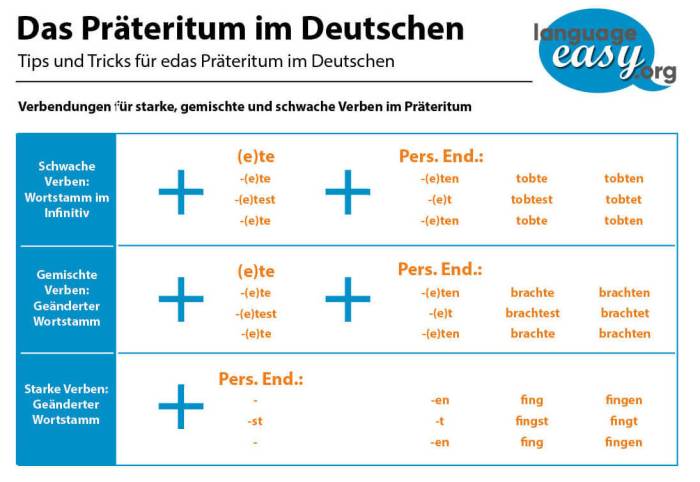Denn sentences in german exercises – Embark on a journey into the realm of German grammar with our in-depth exploration of denn sentences. Discover their purpose, usage, and nuances, empowering you to enhance your German communication skills.
Delve into the intricacies of denn sentences, unraveling the various types, their placement within sentences, and the punctuation rules that govern them. Through practical exercises and real-world examples, you will gain a comprehensive understanding of this essential grammatical concept.
Denn Sentences in German Exercises: Introduction
Denn sentences play a crucial role in German grammar, serving to provide explanations, reasons, or justifications for preceding statements. They are commonly used to elaborate on or clarify ideas, offering additional context or insights.
Denn sentences are characterized by the conjunction “denn,” which is typically placed at the beginning of the clause or sentence. This conjunction signals the transition to an or justificatory statement.
Types of Denn Sentences
Causal Denn Sentences
Causal denn sentences express a cause-and-effect relationship between two events or actions. They explain why something happened or is happening.
- Ich habe gestern Abend nicht geschlafen, denn ich hatte zu viel Kaffee getrunken.
- Er ist krank, denn er hat eine Erkältung.
Denn Sentences
denn sentences provide additional information or clarification about a preceding statement. They help to elaborate on or explain the context or meaning.
- Die Prüfung war schwierig, denn der Stoff war sehr umfangreich.
- Ich mag diese Stadt, denn sie ist sehr lebendig.
Justificatory Denn Sentences
Justificatory denn sentences provide a justification or reason for a particular action, decision, or belief. They explain why something is being done or believed.
- Ich habe mich für diesen Job entschieden, denn er bietet mir gute Aufstiegsmöglichkeiten.
- Ich glaube an Gott, denn ich habe viele Erfahrungen gemacht, die mich dazu geführt haben.
Placement of Denn
In German sentences, the conjunction “denn” is typically placed at the beginning of the subordinate clause or sentence that provides the explanation or justification.
- Ich habe nicht geschlafen, denn ich hatte zu viel Kaffee getrunken.
- Die Prüfung war schwierig, denn der Stoff war sehr umfangreich.
However, there are some exceptions to this rule. In some cases, “denn” can be placed after the subject or after the verb in the subordinate clause.
- Denn ich hatte zu viel Kaffee getrunken, habe ich nicht geschlafen.
- Der Stoff war sehr umfangreich, denn die Prüfung war schwierig.
Punctuation with Denn Sentences

When using denn sentences, it is important to follow the correct punctuation rules.
- In most cases, a comma is placed before the conjunction “denn.”
- Ich habe nicht geschlafen, denn ich hatte zu viel Kaffee getrunken.
- The subordinate clause introduced by “denn” is usually separated from the main clause by a comma.
- Die Prüfung war schwierig, denn der Stoff war sehr umfangreich.
However, there are some exceptions to these rules. In some cases, a semicolon may be used instead of a comma before “denn.”
Denn Sentences in Context

| Sentence | Type | Usage |
|---|---|---|
| Ich habe nicht geschlafen, denn ich hatte zu viel Kaffee getrunken. | Causal | Explains why the speaker did not sleep. |
| Die Prüfung war schwierig, denn der Stoff war sehr umfangreich. | Provides additional information about why the exam was difficult. | |
| Ich habe mich für diesen Job entschieden, denn er bietet mir gute Aufstiegsmöglichkeiten. | Justificatory | Justifies the speaker’s decision to choose the job. |
Exercises and Practice
Exercise 1: Identify the Type of Denn Sentence
Identify the type of denn sentence in each of the following examples:
- Ich bin müde, denn ich habe gestern Abend nicht gut geschlafen.
- Die Stadt ist sehr schön, denn sie liegt am Meer.
- Ich glaube an die Liebe, denn ich habe sie selbst erlebt.
Exercise 2: Complete the Denn Sentences, Denn sentences in german exercises
Complete the following denn sentences with a suitable explanation or justification:
- Ich habe mir ein neues Auto gekauft, denn…
- Ich liebe meine Familie, denn…
- Ich möchte Arzt werden, denn…
Exercise 3: Write Your Own Denn Sentences
Write three of your own denn sentences, each representing a different type (causal, , justificatory).
Essential Questionnaire
What is the primary purpose of denn sentences?
Denn sentences are used to provide explanations, reasons, or justifications for statements or actions.
How many types of denn sentences are there?
There are two main types of denn sentences: causal and inferential.
Where is denn typically placed in a sentence?
Denn is usually placed at the beginning of the subordinate clause that provides the explanation or reason.